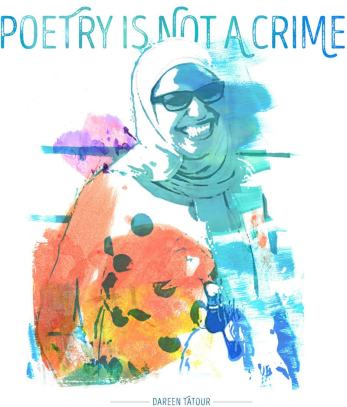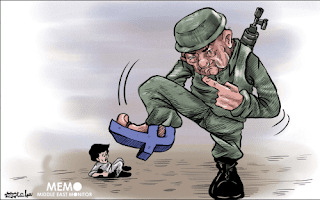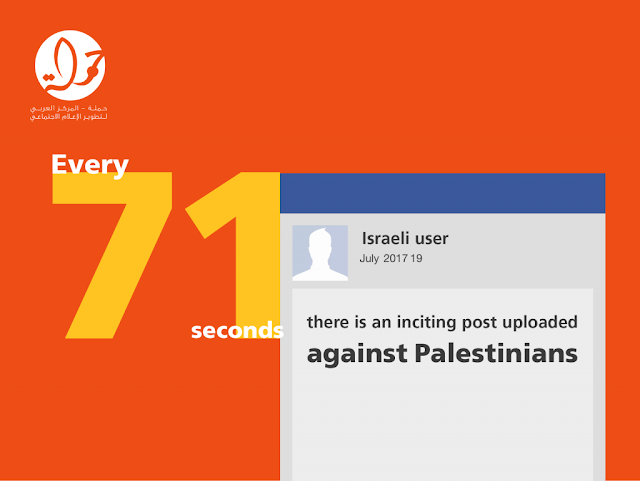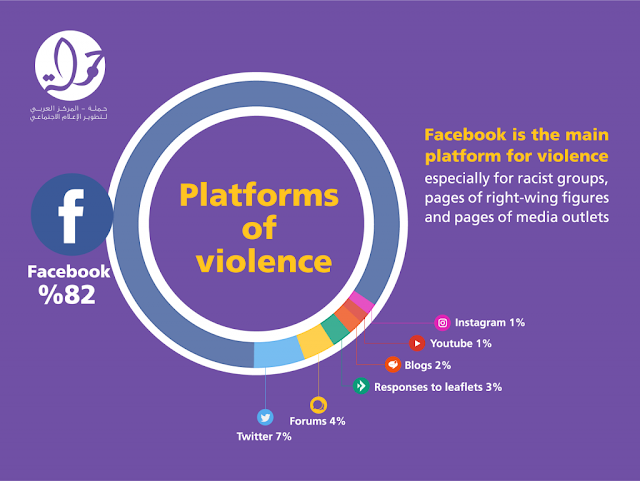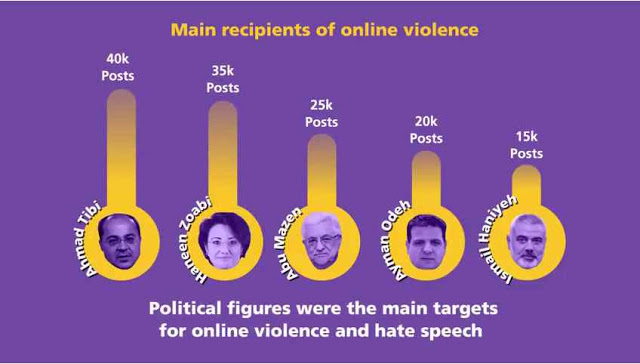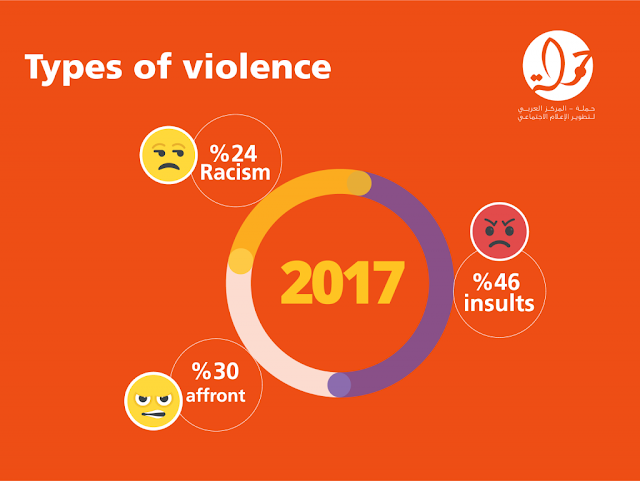What Kind of State Gaols
and Prosecutes a Poet for Incitement? A
Police State
The myth of Israel as a democratic state is
widespread. In the words of Emily
Thornberry, Labour’s racist Shadow Foreign Secretary, ‘Modern Israel is a beacon of freedom,
equality and democracy.”
widespread. In the words of Emily
Thornberry, Labour’s racist Shadow Foreign Secretary, ‘Modern Israel is a beacon of freedom,
equality and democracy.”
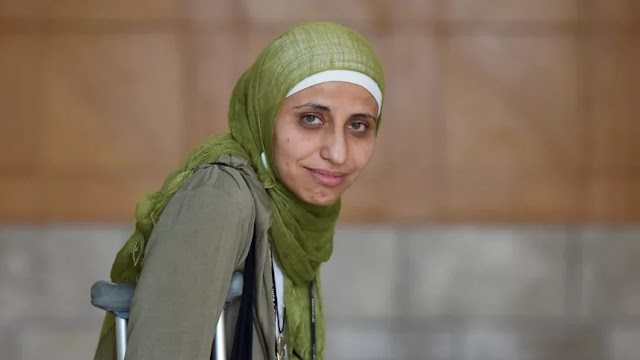 |
| Dareen Tatour |
Labour’s racist Shadow Foreign Secretary, Emily Thornberry
As Ahmed Tibi quipped,
Israel is a democratic state for Jews and a Jewish state for Arabs.
Israel is a democratic state for Jews and a Jewish state for Arabs.
In practice even for Jews, Israel is becoming less
and less democratic. The term ‘leftist’
is today a term of abuse in Israel. Israeli human rights NGO’s – even liberal Zionist
ones like B’tselem and Breaking the Silence – are under
increasing pressure from legislation such as the NGO
Law that forced them to highlight their funding prominently when over half
of it comes from overseas whereas right-wing NGO’s, which typically receive
their money from private individuals are exempt. The idea being to portray them as in hock to
foreign interests and therefore traitors.
After having been gaoled and
held under house arrested for 2½ years, this month Palestinian Israeli poet
Dareen Tatour was, predictably, convicted by an Israeli magistrate of incitement to violence
and support for terrorism. As Jonathan Cook observed,
Dareen had endured
two and a half years of jail and harsh house arrest – denied access to computers and phones. Now she is at risk of a sentence of up to eight
additional years in prison.
held under house arrested for 2½ years, this month Palestinian Israeli poet
Dareen Tatour was, predictably, convicted by an Israeli magistrate of incitement to violence
and support for terrorism. As Jonathan Cook observed,
Dareen had endured
two and a half years of jail and harsh house arrest – denied access to computers and phones. Now she is at risk of a sentence of up to eight
additional years in prison.
 |
| Emily Thornberry – Labour’s Racist Shadow Foreign Secretary |
Poetry invariably exploits complexities of language and ambiguities of
meaning but over the protests of scholars of the Arabic language, the court
relied on translations of Tatour’s poetry by an Israeli policeman who translated the Arabic word “shaheed”, which for Palestinians
refers to any victim of Israeli oppression, to “terrorist”.
meaning but over the protests of scholars of the Arabic language, the court
relied on translations of Tatour’s poetry by an Israeli policeman who translated the Arabic word “shaheed”, which for Palestinians
refers to any victim of Israeli oppression, to “terrorist”.
“It is not a trial, it is a
theatrical play,” Tatour said of the legal proceedings.
theatrical play,” Tatour said of the legal proceedings.
A handful of Israeli literary figures, including the author A B Yehoshua,
protested at the unprecedented move to jail a poet, something they noted that
even the most repressive regimes usually avoid doing.
protested at the unprecedented move to jail a poet, something they noted that
even the most repressive regimes usually avoid doing.
Israeli Jewish incitement against Arabs never merits any attention from the State
A Hebrew literature professor, Nissim Calderon, warned: “What begins
by undermining the freedom of a Palestinian poet will surely continue by
undermining the freedom of Israeli poets.”
by undermining the freedom of a Palestinian poet will surely continue by
undermining the freedom of Israeli poets.”
Yet the real incitement is against Israel’s
Arab citizens. The lie about Palestinians being ‘incited’ to oppose the Israeli
occupation (because they would otherwise love it!) hides the fact that there is
an ongoing campaign of harassment and threats from Israeli posters to social
media. Without exception Israeli incitement
against Palestinians goes unpunished.
But if a poet makes a reference to resistance then the full force of the
law descends on her.
Arab citizens. The lie about Palestinians being ‘incited’ to oppose the Israeli
occupation (because they would otherwise love it!) hides the fact that there is
an ongoing campaign of harassment and threats from Israeli posters to social
media. Without exception Israeli incitement
against Palestinians goes unpunished.
But if a poet makes a reference to resistance then the full force of the
law descends on her.
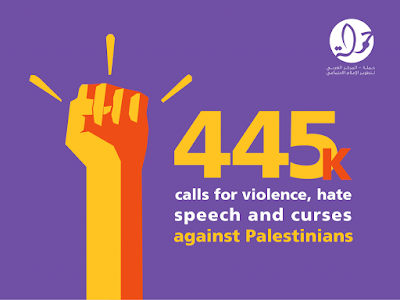 |
| Israeli Jewish incitement against Arabs never merits attention from the State |
However in the two years, between November
2015 and October 2017 some 280 Palestinians were arrested
for posts on Facebook.
2015 and October 2017 some 280 Palestinians were arrested
for posts on Facebook.
A Report
from 7amleh,
the Arab Centre for the Advancement of Social Media shows what the reality of
incitement on social media really consists of.
from 7amleh,
the Arab Centre for the Advancement of Social Media shows what the reality of
incitement on social media really consists of.
·
Every 71 seconds there is an inciting post uploaded against Palestinians
Every 71 seconds there is an inciting post uploaded against Palestinians
·
A total of 445,000 calls for violence, hate speech posts and curses
against Palestinians
A total of 445,000 calls for violence, hate speech posts and curses
against Palestinians
·
One out of nine posts about Palestinians contains a call for violence or
a curse
One out of nine posts about Palestinians contains a call for violence or
a curse
·
50,000 Israeli social media users wrote at least one inciting post
against Palestinians
50,000 Israeli social media users wrote at least one inciting post
against Palestinians
May 4, 2018 By Richard
Silverstein
Silverstein
Dareen Tatour, the poet as terrorist-criminal
Young Palestinian poet, Dareen
Tatour, wrote a poem in the midst of
the Knife Intifada three years ago. Entitled, Resist, the poem called
for resistance against Israeli Occupation, and steadfastness in the face of
oppression. Standard poetic themes in the face of injustice. There are
literally thousands of similar poems, including memorable ones written by
Israel’s first national poet, Haim Nachman Bialik.
Tatour, wrote a poem in the midst of
the Knife Intifada three years ago. Entitled, Resist, the poem called
for resistance against Israeli Occupation, and steadfastness in the face of
oppression. Standard poetic themes in the face of injustice. There are
literally thousands of similar poems, including memorable ones written by
Israel’s first national poet, Haim Nachman Bialik.
But in Israel, writing such a poem and using Facebook and YouTube to
disseminate it will get you branded a terrorist. Dareen was arrested three
years ago. Her trial was postponed for that entire period and she was placed
under strict house arrest. She was only permitted to leave her home once per
weekend, and then only with police minders.
disseminate it will get you branded a terrorist. Dareen was arrested three
years ago. Her trial was postponed for that entire period and she was placed
under strict house arrest. She was only permitted to leave her home once per
weekend, and then only with police minders.
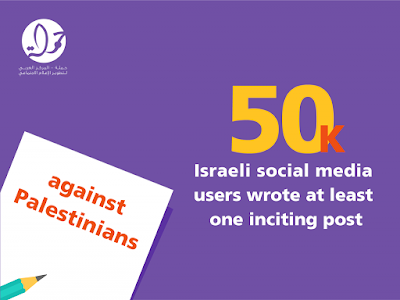 |
| Israeli Jewish incitement against Arabs never merits any attention from the State |
Yesterday, the court
finally made a decision in her
case: guilty. No surprise since Israeli courts convict 98% of Palestinian
security defendants of their “crimes.” Dareen was found guilty of “incitement”
and belonging to a terror group. It makes no difference that she doesn’t belong
to any terrorist group. Expressing sympathy with the goals of the Palestinian
national movement is enough to be deemed a terrorist.
finally made a decision in her
case: guilty. No surprise since Israeli courts convict 98% of Palestinian
security defendants of their “crimes.” Dareen was found guilty of “incitement”
and belonging to a terror group. It makes no difference that she doesn’t belong
to any terrorist group. Expressing sympathy with the goals of the Palestinian
national movement is enough to be deemed a terrorist.
Here is an eyewitness account of the shameful spectacle presided over by
Judge Adi
Bambilia, a judge so ashamed of her
verdict that she mumbled her way through it so it would be that much harder for
the assembled world media to know the result and report it:
Judge Adi
Bambilia, a judge so ashamed of her
verdict that she mumbled her way through it so it would be that much harder for
the assembled world media to know the result and report it:
The judge came in only after the media was allowed to take pictures in
the courtroom. She sat on her high bench, said that the verdict is long, and
that she would read only some of it. She read in a low voice and people
complained that they can’t hear. She usually uses a mike – but not today. The
guards wanted to throw out of the court the people that complained – but the
judge requested them not to do it.
the courtroom. She sat on her high bench, said that the verdict is long, and
that she would read only some of it. She read in a low voice and people
complained that they can’t hear. She usually uses a mike – but not today. The
guards wanted to throw out of the court the people that complained – but the
judge requested them not to do it.
It all took hardly a few minutes, The only sentence that could be heard
clearly was when the judge cited some old court ruling about the importance of
the freedom of expression. Soon she concluded: “I decided to convict…” Then she
went on in a very low voice to name the articles of conviction by their
technical numbers, without any explanation, and soon disappeared through the
back-door to her chamber.
clearly was when the judge cited some old court ruling about the importance of
the freedom of expression. Soon she concluded: “I decided to convict…” Then she
went on in a very low voice to name the articles of conviction by their
technical numbers, without any explanation, and soon disappeared through the
back-door to her chamber.
Just one item indicating the ludicrousness of the Israeli State’s case
against Dareen. It presented as an expert witness, a “translator” who
grievously mistranslated her poem to claim it called for violence. The
prosecution called the witness an “expert” in both spoken and literary Arabic,
when he couldn’t even translate her poem properly. You remember Bibi’s dog and
pony show headlined by the charge: “Iran Lied.” Well, forget that. Israel lied,
“big time,” as both Trump and Netanyahu would say.
against Dareen. It presented as an expert witness, a “translator” who
grievously mistranslated her poem to claim it called for violence. The
prosecution called the witness an “expert” in both spoken and literary Arabic,
when he couldn’t even translate her poem properly. You remember Bibi’s dog and
pony show headlined by the charge: “Iran Lied.” Well, forget that. Israel lied,
“big time,” as both Trump and Netanyahu would say.
Dareen’s plight might have amounted to little amidst the sea of
suffering and injustice perpetrated on Palestinians regularly by the Israeli
military-intelligence apparatus, but her cause was taken up by an international
human rights campaign supported by, among others, the literary
freedom NGO, PEN. Its director visited Dareen
under house arrest and took a picture with her to show the international
artistic world’s solidarity.
suffering and injustice perpetrated on Palestinians regularly by the Israeli
military-intelligence apparatus, but her cause was taken up by an international
human rights campaign supported by, among others, the literary
freedom NGO, PEN. Its director visited Dareen
under house arrest and took a picture with her to show the international
artistic world’s solidarity.
While Israel may deem a terrorist, I honor her here by publishing her
original video including her poem and its Hebrew and English translations. Keep
in mind that Israel considers all of us accessories to terrorism by merely
reading this. By the way, YouTube has restricted the video warning viewers that
it contains inappropriate content. You have to click through the warning before
you can view it. Thanks YouTube for standing for artistic freedom in the face
of Israeli censoriousness!
original video including her poem and its Hebrew and English translations. Keep
in mind that Israel considers all of us accessories to terrorism by merely
reading this. By the way, YouTube has restricted the video warning viewers that
it contains inappropriate content. You have to click through the warning before
you can view it. Thanks YouTube for standing for artistic freedom in the face
of Israeli censoriousness!
Here is a statement Dareen’s lawyer, Gaby Lasky, published on Facebook
yesterday. I’ve translated it:
yesterday. I’ve translated it:
English translation:
Resist, My People, Resist Them
In Jerusalem, I dressed my wounds
and breathed my sorrows
And carried the soul in my palm
For an Arab Palestine.
and breathed my sorrows
And carried the soul in my palm
For an Arab Palestine.
I will not succumb to the
“peaceful solution,”
Never lower my flags
Until I evict them from my land.
I cast them aside for a coming time.
“peaceful solution,”
Never lower my flags
Until I evict them from my land.
I cast them aside for a coming time.
Resist, my people, resist them.
Resist the settler’s robbery
And follow the caravan of martyrs.
Shred the disgraceful constitution
Which imposed degradation and humiliation
And deterred us from restoring justice.
Resist the settler’s robbery
And follow the caravan of martyrs.
Shred the disgraceful constitution
Which imposed degradation and humiliation
And deterred us from restoring justice.
They burned blameless children;
As for Hadil, the sniper shot her in public,
Killed her in broad daylight.
As for Hadil, the sniper shot her in public,
Killed her in broad daylight.
Resist, my people, resist them.
Resist the colonialist’s onslaught.
Pay no mind to his agents among us
Who chain us with the peaceful illusion.
Do not fear doubtful tongues;
The truth in your heart is stronger,
As long as you resist in a land
That has lived through raids and victory.
Resist the colonialist’s onslaught.
Pay no mind to his agents among us
Who chain us with the peaceful illusion.
Do not fear doubtful tongues;
The truth in your heart is stronger,
As long as you resist in a land
That has lived through raids and victory.
So Ali called from his grave:
Resist, my rebellious people.
Write me as prose on the agarwood;
My remains have you as a response.
Resist, my rebellious people.
Write me as prose on the agarwood;
My remains have you as a response.
Resist, my people, resist them.
Hebrew translation (actually done by Israelis who know Arabic!):
‘What’s more
surprising is that there are still people in Israel who expect a fair trial for
Palestinians … as if Israel were still a democracy’
surprising is that there are still people in Israel who expect a fair trial for
Palestinians … as if Israel were still a democracy’
May
06, 2018 9:15 PM
06, 2018 9:15 PM
 |
| Poet Dareen Tatour at the Nazareth Magistrate’s Court on May 3, 2018 Credit Gil Eliahu |
Israeli literary figures lambasted Thursday’s conviction of Arab poet Dareen Tatour on
charges of incitement to violence and support for a terrorist organization.
charges of incitement to violence and support for a terrorist organization.
The Nazareth Magistrate’s Court convicted Tatour,
36, on account of three posts published on social media, including a poem titled,
“Resist,
my people, resist them.” According to a translation of the
Arabic-language poem that appeared in the indictment, it included the lines, “I won’t agree to a peaceful solution / I’ll
never lower my flag / until I remove them from my homeland.”
36, on account of three posts published on social media, including a poem titled,
“Resist,
my people, resist them.” According to a translation of the
Arabic-language poem that appeared in the indictment, it included the lines, “I won’t agree to a peaceful solution / I’ll
never lower my flag / until I remove them from my homeland.”
Tatour, an Israeli Arab who lives in Reineh, near
Nazareth in the country’s north, said after the verdict that she didn’t regret
anything and planned to appeal the ruling.
Nazareth in the country’s north, said after the verdict that she didn’t regret
anything and planned to appeal the ruling.
“I wasn’t surprised
by the verdict, given everything that’s been happening here,”
said Ilana Hammerman, an editor, translator and
writer. “The Israeli justice system has
been taking this attitude for many years already. What’s more surprising is
that there are still people in Israel who expect a fair trial for Palestinians
and opponents of Israeli policy … as if Israel were still a democracy. Anyone
who’s surprised is someone who’s sitting with his eyes closed. This is the
general direction in which Israel is heading.”
by the verdict, given everything that’s been happening here,”
said Ilana Hammerman, an editor, translator and
writer. “The Israeli justice system has
been taking this attitude for many years already. What’s more surprising is
that there are still people in Israel who expect a fair trial for Palestinians
and opponents of Israeli policy … as if Israel were still a democracy. Anyone
who’s surprised is someone who’s sitting with his eyes closed. This is the
general direction in which Israel is heading.”
Bottom
of Form
of Form
“It’s
impossible to know whether this government attributes such importance to poetic
imagery that it pounces like this on a Palestinian poet, or whether its compete
lack of understanding of poetry causes it to treat every word like a drawn
knife,” said author A.B. Yehoshua,
an Israel Prize laureate. “The time has
come for judges to read more Hebrew poetry throughout the generations and see
the imagery and language it contains.”
impossible to know whether this government attributes such importance to poetic
imagery that it pounces like this on a Palestinian poet, or whether its compete
lack of understanding of poetry causes it to treat every word like a drawn
knife,” said author A.B. Yehoshua,
an Israel Prize laureate. “The time has
come for judges to read more Hebrew poetry throughout the generations and see
the imagery and language it contains.”
Nissim Calderon, a Hebrew literature professor at
Ben-Gurion University of the Negev who served as a witness in the trial, said, “The verdict is a blow to one of the deepest
traditions of Hebrew poetry – the poet’s freedom from being put on trial over
his words. This was upheld under British rule toward Hebrew poets who called
for the use of violence, and it’s of value to Israelis themselves even before
being an obligation toward the occupied Palestinians. What begins by
undermining the freedom of a Palestinian poet will surely continue by
undermining the freedom of Israeli poets.”
Ben-Gurion University of the Negev who served as a witness in the trial, said, “The verdict is a blow to one of the deepest
traditions of Hebrew poetry – the poet’s freedom from being put on trial over
his words. This was upheld under British rule toward Hebrew poets who called
for the use of violence, and it’s of value to Israelis themselves even before
being an obligation toward the occupied Palestinians. What begins by
undermining the freedom of a Palestinian poet will surely continue by
undermining the freedom of Israeli poets.”
Navit Barel, a poet and editor, said, “This isn’t an issue related to literary
taste or editorial choice. It’s an issue of freedom and justice. This is a sad
and frightening day for Israeli democracy. The court was asked to rule on the
interpretation of a poem in a language the judge doesn’t read, and it decided
this poem was dangerous.”
taste or editorial choice. It’s an issue of freedom and justice. This is a sad
and frightening day for Israeli democracy. The court was asked to rule on the
interpretation of a poem in a language the judge doesn’t read, and it decided
this poem was dangerous.”
Barel noted that she has heard demonstrators at a
protest shouting, “Rabin is looking for a
friend” – a reference to assassinated Prime Minister Yitzhak Rabin – at the
army’s chief of staff. “Which of them was
sentenced as an inciter?” she asked, adding, “I’ve heard a Hebrew refrain on the radio in which a singer sang that
leftists are killing their brothers, handing them over to foreigners. The law
clearly laid down rules on the question of what constitutes incitement. Would
an Israeli Jew who said or wrote much worse things than the poem in question be
brought to trial?”
protest shouting, “Rabin is looking for a
friend” – a reference to assassinated Prime Minister Yitzhak Rabin – at the
army’s chief of staff. “Which of them was
sentenced as an inciter?” she asked, adding, “I’ve heard a Hebrew refrain on the radio in which a singer sang that
leftists are killing their brothers, handing them over to foreigners. The law
clearly laid down rules on the question of what constitutes incitement. Would
an Israeli Jew who said or wrote much worse things than the poem in question be
brought to trial?”
Tatour was arrested in October 2015, when
Palestinians were carrying out stabbing attacks against Jews almost daily. The
indictment accused her of publishing posts on Facebook and YouTube “which contained calls to commit acts of
violence or terror and for praising and identifying with acts of violence or
terrorism.”
Palestinians were carrying out stabbing attacks against Jews almost daily. The
indictment accused her of publishing posts on Facebook and YouTube “which contained calls to commit acts of
violence or terror and for praising and identifying with acts of violence or
terrorism.”
One video clip she posted showed masked men
throwing stones and firebombs at Israeli security forces with a voiceover of
her reading her poem. By the time the indictment was filed, the prosecution
said, the clip had been watched more than 200 times and received several
favorable responses.
throwing stones and firebombs at Israeli security forces with a voiceover of
her reading her poem. By the time the indictment was filed, the prosecution
said, the clip had been watched more than 200 times and received several
favorable responses.
“The content, its
exposure and the circumstances of its publication created a real possibility
that acts of violence or terrorism will be committed,”
the indictment said.
exposure and the circumstances of its publication created a real possibility
that acts of violence or terrorism will be committed,”
the indictment said.
Aside from the “Resist” poem, Tatour was charged
over two other posts. In one, she wrote, “Allah
Akbar and praise God, Islamic Jihad has decreed a continuation of the intifada
throughout the West Bank and its expansion to all of Palestine. We must begin
within the Green Line,” meaning inside Israel. That post received 35 likes.
over two other posts. In one, she wrote, “Allah
Akbar and praise God, Islamic Jihad has decreed a continuation of the intifada
throughout the West Bank and its expansion to all of Palestine. We must begin
within the Green Line,” meaning inside Israel. That post received 35 likes.
The second post contained a picture of Asra’a Abed,
a Nazareth resident who was shot and wounded after pulling out a knife in
Afula’s central bus station, along with the caption “I’m the next martyr.”
a Nazareth resident who was shot and wounded after pulling out a knife in
Afula’s central bus station, along with the caption “I’m the next martyr.”
See Sharing
Rhymes, Hundreds Support Arrested Palestinian Poet Dareen Tatour in Jaffa
‘People shouldn’t go to jail in Israel because of poetry’ says one
attendee of a Jaffa event rallying for poet who has been under house arrest
since October 2015
attendee of a Jaffa event rallying for poet who has been under house arrest
since October 2015
Aug
31, 2017 6:03 PM
31, 2017 6:03 PM
 |
| Full house for the solidarity event supporting Palestinian poet Dareen Tatour in Jaffa, August 30, 2017. Daniel Tchetchik |
There was only room to stand in the Arab-Hebrew Theater of Jaffa on
Wednesday night as hundreds showed their support for Palestinian
poet Dareen Tatour, who was arrested in October 2015 after posting a
poem on YouTube and Facebook.
Wednesday night as hundreds showed their support for Palestinian
poet Dareen Tatour, who was arrested in October 2015 after posting a
poem on YouTube and Facebook.
Tatour, who was charged with incitement, has now been under house arrest
in her parents’ home in the Galilee village of Reineh, near Nazareth, for
almost two years.
in her parents’ home in the Galilee village of Reineh, near Nazareth, for
almost two years.
The auditorium was so full that organizers had to place additional seats
in the foyer for attendees.
in the foyer for attendees.
“She’s been under arrest for two
years because of a poem denouncing the murderers of Mohammed
Abu Khdeir and the Dawabsheh
family,” said
Tatour’s father, Tawfik, who opened the event. He was referring to the July 2014
killing of a East Jerusalem teenager and the deaths of three members of a
Palestinian family during an arson attack in the West Bank the following year.
years because of a poem denouncing the murderers of Mohammed
Abu Khdeir and the Dawabsheh
family,” said
Tatour’s father, Tawfik, who opened the event. He was referring to the July 2014
killing of a East Jerusalem teenager and the deaths of three members of a
Palestinian family during an arson attack in the West Bank the following year.
“Despite the great injustice that was
done to Dareen, we can and must live together in peace,” her father stated. “Regrettably, the ministers and prime
minister use every chance they get to incite – not only against Arabs but
against anyone who doesn’t agree with them; against anyone who wants to live in
a world without occupation and racism,” he added.
done to Dareen, we can and must live together in peace,” her father stated. “Regrettably, the ministers and prime
minister use every chance they get to incite – not only against Arabs but
against anyone who doesn’t agree with them; against anyone who wants to live in
a world without occupation and racism,” he added.
 |
| Actors Leora Rivlin and Doron Tavori reading transcripts from Dareen Tatour’s trial, August 30, 2017. Daniel Tchetchik |
“In October 2015, the police stormed
the house of poet Dareen Tatour,” said journalist Orly Noy, hosting the evening. “Only during the third time they interrogated
her did they show her the poem for which they arrested her, and for which she
has been under arrest for two years.”
the house of poet Dareen Tatour,” said journalist Orly Noy, hosting the evening. “Only during the third time they interrogated
her did they show her the poem for which they arrested her, and for which she
has been under arrest for two years.”
“There’s a tendency to persecute
Arab Israelis who see themselves as Palestinians, express their opinion on the
occupation and object to Israel’s policy,” Noy added. “Today, we cry out: ‘Dareen Tatour is not alone!’”
Arab Israelis who see themselves as Palestinians, express their opinion on the
occupation and object to Israel’s policy,” Noy added. “Today, we cry out: ‘Dareen Tatour is not alone!’”
“Dareen is undergoing a Kafkaesque
trial,” said
Tatour’s lawyer, Gaby Lasky. “The
indictment says ‘The State of Israel against Dareen Tatour.’ It should be
Dareen’s indictment against Israeli society, which reads poetry by a poet who
says ‘I’m the next victim’ and then persecutes her. This is a society that
accuses the victim. A poet must be protected. People shouldn’t go to jail in
Israel because of poetry.”
trial,” said
Tatour’s lawyer, Gaby Lasky. “The
indictment says ‘The State of Israel against Dareen Tatour.’ It should be
Dareen’s indictment against Israeli society, which reads poetry by a poet who
says ‘I’m the next victim’ and then persecutes her. This is a society that
accuses the victim. A poet must be protected. People shouldn’t go to jail in
Israel because of poetry.”
Palestinian rap artist Tamer Nafar performed “Spoken Word,” while poets Tal Nitzan and Mahmoud Abu Arisha recited
some of their poems. Actors Doron Tavori and Leora Rivlin read some of Tatour’s
trial transcripts. Writer Sheikha Haliwa and poet Rachel Peretz read poems
penned by Tatour. Haliwa read them in Arabic and Peretz read their Hebrew
translation.
some of their poems. Actors Doron Tavori and Leora Rivlin read some of Tatour’s
trial transcripts. Writer Sheikha Haliwa and poet Rachel Peretz read poems
penned by Tatour. Haliwa read them in Arabic and Peretz read their Hebrew
translation.
“Tatour may not be a great poet,” said one of the audience members, “but arresting her is a stupid, dangerous
act. People’s freedom of expression must not be limited, regardless of their
work’s quality or disagreements about it.”
act. People’s freedom of expression must not be limited, regardless of their
work’s quality or disagreements about it.”
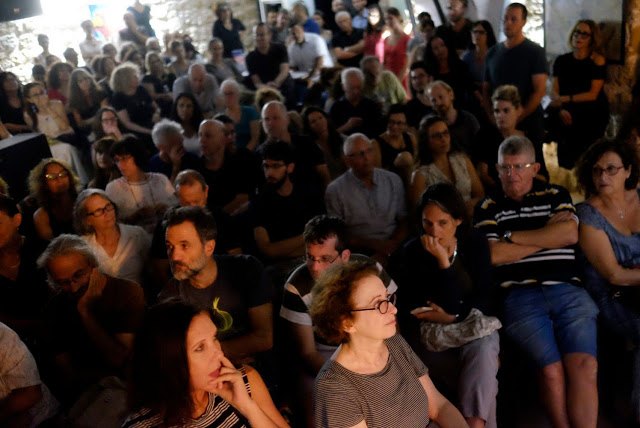 |
| Attendees at the evening in support of poet Dareen Tatour in Jaffa, August 30, 2017. Daniel Tchetchik |
A short film was screened in which Tatour read one of her poems, “Resist, My People, Resist Them,”
accompanied by dramatic music and images of riots between soldiers and
Palestinians. The audience applauded.
accompanied by dramatic music and images of riots between soldiers and
Palestinians. The audience applauded.
7amleh
Centre recently conducted a research to measure the extent of Israeli
incitement against Palestinians on social media for the year 2017, which has
been published today. The main key findings were as follows:
Centre recently conducted a research to measure the extent of Israeli
incitement against Palestinians on social media for the year 2017, which has
been published today. The main key findings were as follows:
·
Every 71 seconds there is an inciting post uploaded
against Palestinians
Every 71 seconds there is an inciting post uploaded
against Palestinians
·
A total of 445,000 calls for violence, hate speech
posts and curses against Palestinians
A total of 445,000 calls for violence, hate speech
posts and curses against Palestinians
·
One out of nine posts about Palestinians contains a
call for violence or a curse
One out of nine posts about Palestinians contains a
call for violence or a curse
·
50,000 Israeli social media users wrote at least
one inciting post against Palestinians
50,000 Israeli social media users wrote at least
one inciting post against Palestinians
Whilst
Facebook intensifies its efforts to suspend, delete and ban Palestinian
accounts and pages under the pretext of “incitement”, the social media giant
expanded its platform for Israeli incitement, 82% of which takes place on
Facebook, according to a recent study conducted by 7amleh. 2017 witnessed a
rapid upsurge of right wing Israeli Facebook groups and pages that incite
against Palestinians, some of which include The Shadow (an extreme right-wing
Israeli singer), Roaring for the Right, Against Extreme Leftist Media,
Reclaiming Jewish Nationality, Fighting for the Land of Israel and The Lies of
the Leftists (all translated from Hebrew) in addition to the rising incitement
perpetrated on Facebook pages of mainstream Israeli media.
Facebook intensifies its efforts to suspend, delete and ban Palestinian
accounts and pages under the pretext of “incitement”, the social media giant
expanded its platform for Israeli incitement, 82% of which takes place on
Facebook, according to a recent study conducted by 7amleh. 2017 witnessed a
rapid upsurge of right wing Israeli Facebook groups and pages that incite
against Palestinians, some of which include The Shadow (an extreme right-wing
Israeli singer), Roaring for the Right, Against Extreme Leftist Media,
Reclaiming Jewish Nationality, Fighting for the Land of Israel and The Lies of
the Leftists (all translated from Hebrew) in addition to the rising incitement
perpetrated on Facebook pages of mainstream Israeli media.
This index
was developed by monitoring violent and inciting rhetoric according to a list
of 100 keywords of expressions, names and personalities in Hebrew with the aim
of measuring the level of violent rhetoric and hate speech at the hands of
Israeli social media users. Interestingly, the results indicate that the level
of Israeli violence on social media has decreased from 2016 but increased from
2015.
was developed by monitoring violent and inciting rhetoric according to a list
of 100 keywords of expressions, names and personalities in Hebrew with the aim
of measuring the level of violent rhetoric and hate speech at the hands of
Israeli social media users. Interestingly, the results indicate that the level
of Israeli violence on social media has decreased from 2016 but increased from
2015.
Jerusalem
was the main focal point for online violence against Palestinians and the
research illustrates that 50,000 inciting posts against Arabs were uploaded in
July 2017 alone in light of the events at Al Aqsa mosque and Israel’s attempt
to install electronic gates. This online violence was mainly directed towards
Palestinian politicians, such as Ahmad Tibi and Haneen Zoabi.
was the main focal point for online violence against Palestinians and the
research illustrates that 50,000 inciting posts against Arabs were uploaded in
July 2017 alone in light of the events at Al Aqsa mosque and Israel’s attempt
to install electronic gates. This online violence was mainly directed towards
Palestinian politicians, such as Ahmad Tibi and Haneen Zoabi.
Nadim
Nashif, the Executive Director of 7amleh has expressed grave concern at the
results of the research, which exposes Facebook’s complicity in perpetuating
the double standards of the Israeli government of silencing and shutting down
Palestinian content whilst allowing for the spread of Israeli incitement.
Furthermore, the Israeli government fails to hold any Israeli accountable for
online violence while at the same time it jails hundreds of Palestinians based
on this unfounded claim of incitement.
Nashif, the Executive Director of 7amleh has expressed grave concern at the
results of the research, which exposes Facebook’s complicity in perpetuating
the double standards of the Israeli government of silencing and shutting down
Palestinian content whilst allowing for the spread of Israeli incitement.
Furthermore, the Israeli government fails to hold any Israeli accountable for
online violence while at the same time it jails hundreds of Palestinians based
on this unfounded claim of incitement.
7amleh is
the only Palestinian non-governmental organization dedicated to utilizing
online resources to empower marginalized Palestinian communities and enhance
their capacities in advocacy and raising social awareness. Our values are based
on the unwavering belief of freedom of speech, we work to protect the digital
rights and freedom of speech for Palestinians. 7amleh, through its dynamic and
community-based approach, works in response to the subjugation of Palestinian
voices and aims to build a Palestinian society that is able to breach
geo-political boundaries and use digital platforms en masse to advance the
community’s rights and well-being, 7amleh conducted this research in
cooperation with Vigo Social Intelligence and Berl Katznelson Foundation.
the only Palestinian non-governmental organization dedicated to utilizing
online resources to empower marginalized Palestinian communities and enhance
their capacities in advocacy and raising social awareness. Our values are based
on the unwavering belief of freedom of speech, we work to protect the digital
rights and freedom of speech for Palestinians. 7amleh, through its dynamic and
community-based approach, works in response to the subjugation of Palestinian
voices and aims to build a Palestinian society that is able to breach
geo-political boundaries and use digital platforms en masse to advance the
community’s rights and well-being, 7amleh conducted this research in
cooperation with Vigo Social Intelligence and Berl Katznelson Foundation.
Posted in Blog

